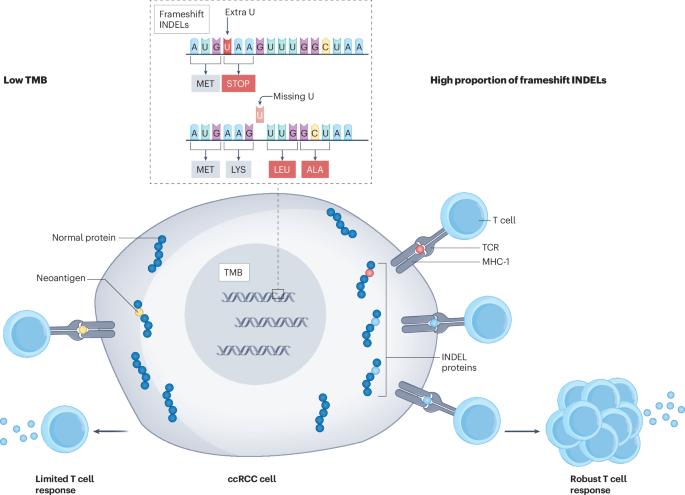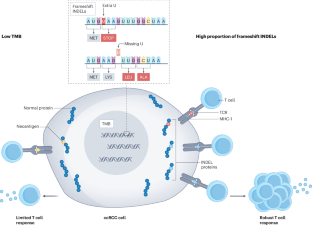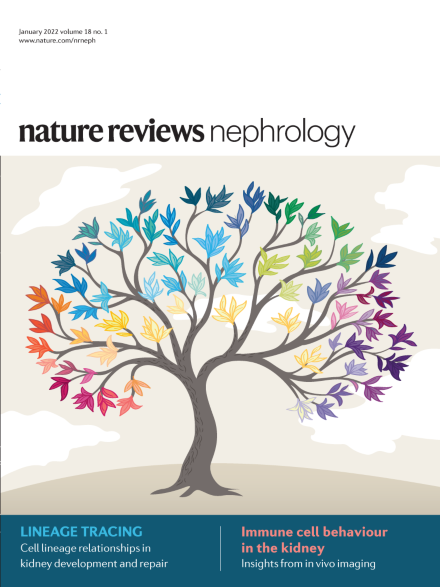Immunological features of clear-cell renal-cell carcinoma and resistance to immune checkpoint inhibitors
IF 39.8
1区 医学
Q1 UROLOGY & NEPHROLOGY
引用次数: 0
Abstract
The advent of immunotherapy has yielded great improvements in survival outcomes of people with clear-cell renal-cell carcinoma (ccRCC). Currently, immune checkpoint inhibitors (ICIs) are the cornerstone of treatment regimens for metastatic ccRCC. Yet a substantial group of patients do not respond to ICIs and few achieve long-term remission, indicating the presence of intrinsic and acquired resistance. The mechanisms underlying ICI resistance in ccRCC remain poorly understood, potentially owing to its unique immunological landscape compared with other immunotherapy-responsive cancers. Specifically, ccRCC is characterized by one of the highest levels of T cell infiltration across different tumours; however, high T cell infiltration does not correlate consistently with improved ICI outcomes. Moreover, the tumour mutational burden in ccRCC is relatively low, compared with that of other immunotherapy-responsive cancers, and fails to predict ICI efficacy. The limited predictive value of these commonly used markers for ICI response underscores the need for deeper exploration of the immunological mechanisms driving the antitumour immune response in ccRCC. Investigating commonalities and disparities with other immunotherapy-responsive cancer types might improve understanding of ICI resistance in ccRCC and inform the development of strategies to enhance the clinical benefits of immunotherapy. Although immune checkpoint inhibitors can prolong survival in people with clear-cell renal-cell carcinoma, disease progression is frequent. Here, the authors explore potential mechanisms that might drive intrinsic or acquired resistance to immune checkpoint inhibitors in clear-cell renal-cell carcinoma, including malignant cell-intrinsic and immune-cell factors.


透明细胞肾细胞癌的免疫学特征和对免疫检查点抑制剂的耐药性
免疫疗法的出现极大地改善了透明细胞肾细胞癌(ccRCC)患者的生存结果。目前,免疫检查点抑制剂(ICIs)是转移性ccRCC治疗方案的基础。然而,相当数量的患者对ICIs没有反应,很少有患者获得长期缓解,这表明存在内在和获得性耐药。与其他免疫治疗应答性癌症相比,ccRCC中ICI耐药的机制尚不清楚,这可能是由于其独特的免疫景观。具体来说,ccRCC的特点是不同肿瘤中T细胞浸润水平最高;然而,高T细胞浸润与改善ICI结果并不一致相关。此外,与其他免疫治疗应答性癌症相比,ccRCC的肿瘤突变负担相对较低,无法预测ICI的疗效。这些常用标志物对ICI反应的有限预测价值强调了对ccRCC中驱动抗肿瘤免疫反应的免疫学机制进行更深入探索的必要性。研究与其他免疫治疗反应性癌症类型的共性和差异可能会提高对ccRCC中ICI耐药性的理解,并为制定提高免疫治疗临床效益的策略提供信息。
本文章由计算机程序翻译,如有差异,请以英文原文为准。
求助全文
约1分钟内获得全文
求助全文
来源期刊

Nature Reviews Nephrology
医学-泌尿学与肾脏学
CiteScore
39.00
自引率
1.20%
发文量
127
审稿时长
6-12 weeks
期刊介绍:
Nature Reviews Nephrology aims to be the premier source of reviews and commentaries for the scientific communities it serves.
It strives to publish authoritative, accessible articles.
Articles are enhanced with clearly understandable figures, tables, and other display items.
Nature Reviews Nephrology publishes Research Highlights, News & Views, Comments, Reviews, Perspectives, and Consensus Statements.
The content is relevant to nephrologists and basic science researchers.
The broad scope of the journal ensures that the work reaches the widest possible audience.
 求助内容:
求助内容: 应助结果提醒方式:
应助结果提醒方式:


